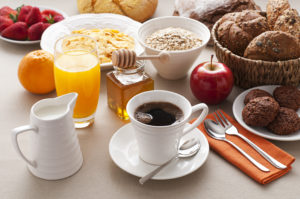Contact us today.
Get a Leg Up on Your Day: Our 30-Day Breakfast Challenge
 Its morning and you’re already running late. Before you rush out the door without eating breakfast consider this: A well planned breakfast puts you in control of your dietary health.
Its morning and you’re already running late. Before you rush out the door without eating breakfast consider this: A well planned breakfast puts you in control of your dietary health.
Missing your breakfast can set you up for overeating later in the day, and it limits your options to what food is available when your hunger is in full bloom.
Eating a healthy morning meal gives you energy, mental acuity and tells your body it’s ok to start burning calories. Eating Breakfast is like telling your body: “Start your Engines!” and if you plan your breakfast well, you can get your day started with healthy choices that are good for your vascular wellbeing.
If you’re not a big fan of eating breakfast, or you just haven’t been good at planning a healthy morning meal, we want you to consider accepting our 30-Day Breakfast Challenge. Just print off this list, make a run to your favorite grocery store and pick up the food listed below.
Dedicate yourself to 30-days of planned healthy morning meals, and then see if it doesn’t change how you feel. We think it will!
Oatmeal
Oats are rich in potassium, omega-3 fatty acids and folate. The best oats are steel-cut (take about 15 minutes to cook) and any oats (rolled or instant) are a healthy choice. Be careful of the flavored varieties, as they are loaded with sugar. Use a little honey and milk instead and top it off with some fresh fruit.
Greek Yogurt
Fast and easy, Greek Yogurt has almost twice the protein of regular yogurt, and if you select a non-fat, plain variety and add some fresh fruit for flavor, you can make a great choice even better.
Blueberries
This little blue fruit is low in calories (80 per cup) and packs a big antioxidant punch. Keep them in your freezer or buy them fresh, either way you can pile them onto your morning yogurt or oatmeal as a flavorful and healthy addition.
Grapefruit
Keep some grapefruit on hand. It’s easy to prepare, hydrating, loaded with antioxidants and has a beneficial effect on blood sugar levels. Some studies even suggest that eating grapefruit is helpful if you are trying to lose weight. Cut a grapefruit in half, eat one part, and put the other in the refrigerator for someone else in the home or as a ready option for tomorrow.
Bananas
Have high blood pressure? Grab a banana as you dash out the door, or slice it up as a flavor booster in your oatmeal. Why? Bananas are rich in potassium: an electrolyte that helps lower your blood pressure naturally. And as an added benefit, slightly green bananas contain resistant starch, a form of carbohydrate that keeps you feeling full longer.
Almond Butter
If you like peanut butter, consider switching to almond butter. Both are a great source of protein and contain about 100 calories per tablespoon, however almond butter contains slightly less saturated fat, is delicious, and it may be a suitable alternative for people who are allergic to peanuts.
Eggs
While an egg yolk contains about 60% of your daily dietary cholesterol, eggs have been making a comeback as a healthy source of vitamin D and protein. Why the change? Research is now suggesting that cholesterol in our food is less of an impact on our internal blood cholesterol than was previously thought. So don’t shy away from a hardboiled or poached egg as a way to start your day.
Cereal
The magic number is 5. Look for a breakfast cereal that contains at least 5 grams of fiber a less than 5 grams of sugar per serving. Typically you’ll find this combination in whole-grain or bran varieties, which have the added bonus of being strong in riboflavin, folic acid and other essential nutrients. Eat your cereal with skim milk and as always, feel free to top it off with some fresh fruit.
Whole-Wheat Bread
If you like a slice of toast in the morning, be sure to make it with bread that was made with whole grains. Carbohydrates are a vital part of breakfast, so just make sure you are careful about what kind of bread you eat. For an even healthier choice, rather than adding butter or jelly, consider eating it with almond butter or egg.
Orange or Cranberry Juice
Orange or Cranberry Juice can be a healthy choice in the morning. When we wake up our bodies are looking for hydration and energy. Fruit juice meets both of these requirements as well as offering vitamins and other nutrients. Just be sure to limit yourself to one glass and don’t drink juice as a replacement for fresh fruit in the morning.
Coffee or Tea
Many studies suggest that a cup of coffee or tea in the morning can have health benefits. Just remember that our bodies process stimulants slower as we age, and caffeine has a half-life of 6 hours, so while that cup of joe or tea will be great at getting you started in the morning, it will also inhibit you from a good nights rest if you continue drinking coffee after 12 noon.
Wheat Germ
While few people will eat wheat germ in large quantities, know that a little bit goes a long way toward your health. Just two tablespoons of wheat germ contains nearly 15% of your daily recommended vitamin E and 10% of your folate. Many people don’t always get enough vitamin E in their diet, so try sprinkling a tablespoon or two into your morning yogurt or cereal as a way to boost nutrients.
Get Started!
Now that you have the list, we hope you will accept our 30-Day Breakfast Challenge and take control of your Dietary Health.

